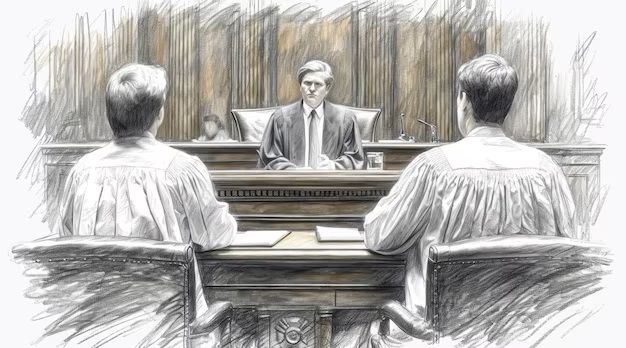The recent developments surrounding the financial intricacies of a prominent business empire have sent ripples through the political landscape. As key players emerge from the shadows to unveil their testimonies, a shift in dynamics is becoming increasingly evident. This situation is not merely a courtroom drama; it is a narrative that intertwines corporate governance, legal repercussions, and public perception.
In the midst of these revelations, an individual whose insight into the inner workings of this organization is unparalleled steps forward. This move is not just an act of compliance; it signifies a strategic repositioning that might alter the course of future events. The implications extend far beyond the walls of the courtroom, potentially reshaping alliances and enmities within the realm of politics.
As we delve deeper into this unfolding story, it becomes crucial to analyze the strategies at play and what they signify for those at the center of this storm. Each testimony and evidence presented acts as a crucial piece in a much larger puzzle, illuminating the intricate dance between power, loyalty, and the quest for justice. The stakes are high, and the outcome remains uncertain, prompting both intrigue and concern among observers nationwide.
The Implications of Weisselberg’s Confession
The recent admission of wrongdoing by a key figure in the inner circle of a prominent political leader carries profound consequences for both the individual involved and the broader political landscape. This event sheds light on potential legal vulnerabilities and raises questions about the integrity of surrounding associates and their actions. The ramifications extend beyond mere personal accountability, hinting at a complex web of influence and power dynamics.
Legal Ramifications
The acknowledgement of misconduct opens avenues for further investigations, potentially implicating additional parties within the organization. As this situation unfolds, it could challenge existing perceptions of accountability and compliance among high-ranking individuals. Furthermore, the possibility of testimonies against other members may signal the beginning of a far-reaching inquiry, affecting not only reputations but also the operational integrity of associated entities.
Political Fallout
On a broader scale, the reverberations of this revelation may alter public sentiment and the political atmosphere. Voters often respond to perceived malfeasance, which can lead to shifts in support and trust towards various factions. The emergence of this narrative could catalyze a reassessment of alliances and strategies, influencing future campaigns and electoral outcomes. Moreover, the media’s portrayal of these events will play a critical role in shaping public opinion and discourse.
In conclusion, the confession serves as a significant turning point that could reshape both legal trajectories and political narratives moving forward. The interplay between justice and politics remains intricate, and the outcomes may define the future landscape for many involved.
Understanding the Legal Framework Involved
This section aims to delve into the intricate web of rules and regulations that shape the ongoing situation, shedding light on the various facets of the judicial process. By exploring the established protocols and standards that govern such cases, a clearer picture of the circumstances can be drawn, illuminating the potential implications for all parties engaged in this matter.
Key Legal Concepts
Several core principles play a crucial role in the unfolding events. These include the mechanisms of prosecution, the rights of individuals involved, and the overall structure of the investigative process. Below is a summarization of the main legal concepts pertinent to this scenario:
| Legal Concept | Description |
|---|---|
| Prosecution | The process by which the state brings charges against an individual based on alleged violations of the law. |
| Defense Rights | The entitlements afforded to individuals accused of crimes, ensuring fair treatment and access to legal representation. |
| Investigative Process | The systematic examination carried out by law enforcement to gather evidence and assess facts related to a case. |
Implications of the Proceedings
The ramifications of these legal procedures extend far beyond just the immediate individuals involved. They may have lasting effects on public perception and the broader political landscape. Understanding these implications requires an appreciation of the power dynamics at play and the potential outcomes of the ongoing judicial activities.
Weisselberg’s Role in Trump’s Organization
The involvement of a certain individual in a high-profile enterprise has garnered considerable attention. His position within the organization provided him with a unique vantage point, allowing insights into financial strategies and operational frameworks. His contributions were integral to the inner workings and success of the enterprise, influencing both daily activities and long-term objectives.
Financial Oversight
This individual was primarily tasked with managing finances, ensuring that transactions were processed smoothly. His responsibilities included:
- Overseeing accounting practices
- Handling payroll and employee benefits
- Monitoring budgets and expenditures
Through his role, he was instrumental in maintaining fiscal accountability, which was vital for the organization’s stability and growth.
Strategic Relationships
Additionally, this figure played a crucial role in cultivating relationships with various stakeholders. His networking abilities facilitated key partnerships and reinforced the organization’s presence in the market. These activities involved:
- Engaging with investors and financial institutions
- Negotiating contracts with suppliers and vendors
- Building alliances within the business community
Ultimately, his contributions went beyond mere financial management; they were essential in propelling the organization forward in a competitive landscape.
Reactions from Trump’s Legal Team
The recent developments in the ongoing investigation have stirred a significant response from the attorneys representing the former president. The atmosphere is charged, with team members expressing their views on the implications of these events for their client. Their collective stance suggests a mix of concern and a firm commitment to mount a robust defense.
Firm Denial of Wrongdoing
In light of the latest twists, legal representatives have been vocal in asserting that their client has acted within the boundaries of the law. They emphasize that the narrative being shaped by opposition voices fails to account for crucial context and misrepresents the situation. This approach seeks to reassure supporters and allies that the accusations are unfounded and politically motivated.
Strategic Legal Maneuvers
The team is already strategizing on how to mitigate the effects of these new developments on their defense posture. They are expected to leverage all available legal avenues, claiming that the situation is more about tactics than truth. In their view, this is an opportunity to highlight perceived inconsistencies within the charges and to rally public sympathy, framing the narrative as one of injustice and overreach. As such, they maintain that the fight is far from over and that they are prepared for an intense legal battle ahead.
Potential Consequences for Trump
The recent developments in the legal landscape surrounding the former leader could have significant ramifications for his future. Various factors, including public perception and strategic challenges, may influence the trajectory of his political career and personal pursuits.
Impact on Public Image
The ongoing judicial proceedings could tarnish the former official’s reputation, leading to a decline in support among both his base and wider audiences. As legal battles unfold, skepticism may grow, affecting voter opinions ahead of upcoming electoral events. This shift might render his ability to rally loyalists more challenging than before.
Political and Financial Repercussions
Aside from image concerns, the implications on resources could be profound. With escalating legal fees and potential liabilities, financial stability may come into question. Furthermore, endorsements and partnerships could dwindle as affiliates reassess their associations. Navigating this intricate web of challenges will be essential to maintaining any influence in the political arena.
Public Perception and Its Impact
The way society views significant events can dramatically influence political landscapes and individual reputations. In tumultuous times, public sentiment often shapes narratives, leading to shifting opinions and reactions that can have far-reaching consequences. Understanding how the collective mindset evolves in response to specific incidents is crucial, as it can dictate the trajectory of ongoing discussions and influence outcomes in various arenas.
Recent developments have sparked a wide array of reactions among the populace, ranging from support to outrage. These emotional responses can sway public discourse and ultimately impact the decisions made by key players in the political sphere. The implications of how situations are framed and perceived cannot be underestimated, as they tend to dictate the nature of discussions in media outlets, social platforms, and even among political commentators.
As narratives unfold, the influence of public perception can lead to increased scrutiny, shifting alliances, and even changes in policy direction. The interplay between perception and reality is often complex, yet profoundly significant. What the public deems acceptable or unacceptable can challenge established norms and redefine political allegiances, creating an environment where reputations can be built or dismantled with remarkable speed.
Ultimately, the ripple effects of these perceptions underscore the importance of maintaining a keen awareness of public sentiment. The capacity for opinion to mobilize action or incite passive observance becomes evident, illuminating the vital role of the populace in shaping the fate of individuals and entities within the political domain.
Q&A: Weisselbergs guilty plea legal coup donald trump
What are the implications of Weisselberg’s guilty plea for Donald Trump?
Weisselberg’s guilty plea has significant implications for Donald Trump, as it suggests a potential unraveling of the financial practices within the Trump Organization. Weisselberg was a key figure in the company and his testimony could lead to further scrutiny of Trump’s business dealings. This guilty plea could also pave the way for additional legal challenges against Trump, as prosecutors may use Weisselberg’s cooperation to build a stronger case against the former president and his associates, whether in terms of financial fraud or tax evasion.
How does Weisselberg’s guilty plea affect the ongoing investigations into Trump?
Weisselberg’s guilty plea is likely to influence the ongoing investigations into Trump significantly. His cooperation with prosecutors could provide critical insights and evidence related to the financial operations of the Trump Organization. If Weisselberg provides information that implicates Trump or indicates a pattern of illegal activity, this could strengthen the prosecutors’ case and lead to new charges against Trump or his business practices. The plea may also motivate other associates to cooperate with authorities, fearing legal repercussions themselves.
Was Weisselberg coerced into taking a guilty plea?
There has been speculation about whether Weisselberg was coerced into his guilty plea or if it was a voluntary decision. Typically, plea deals require some level of negotiation, and defendants often weigh the consequences of going to trial versus accepting a plea. In Weisselberg’s case, his plea deal reportedly includes the possibility of reduced charges in exchange for his cooperation. Such deals are common in the legal system, especially in high-profile cases, but they may raise questions about the motivations behind a plea if a defendant perceives they face overwhelming evidence or a lengthy prison sentence if they choose to fight the charges.
What does “legal coup” mean in the context of Weisselberg’s plea?
In the context of Weisselberg’s plea, the term “legal coup” suggests a significant and possibly surprising shift in the legal landscape surrounding Donald Trump. It implies that the prosecution, through Weisselberg’s cooperation and testimony, is gaining leverage over Trump and his business empire that could potentially lead to serious legal repercussions for him. This phrase reflects the nature of the plea as a strategic move by the legal system to hold powerful figures accountable and might indicate a turning point where Trump’s defenses are being undermined by former associates who have inside knowledge of the alleged misconduct.
What are the potential consequences for Weisselberg after his guilty plea?
After his guilty plea, Weisselberg faces a range of potential consequences. While he may have agreed to cooperate with investigators, which could lead to a lighter sentence, the extent of his cooperation will play a crucial role in determining the ultimate outcome. If his cooperation is deemed sufficient, he may receive a reduced sentence, probation, or even a chance for complete dismissal of charges. However, if he does not provide valuable information or is found not to be fully truthful, he could end up facing the original charges with harsher penalties, including significant prison time. The nature of his plea deal will dictate the severity of the consequences he might face moving forward.
What are the implications of Weisselberg’s guilty plea for Donald Trump’s legal challenges?
Weisselberg’s guilty plea is significant as it could potentially open the door to further legal troubles for Donald Trump. As the former CFO of the Trump Organization, Weisselberg possesses extensive knowledge about the company’s financial dealings and internal practices. His cooperation with prosecutors may lead to more damaging evidence against Trump, particularly concerning allegations of tax fraud and other financial misconduct. Additionally, this plea could encourage other witnesses or associates to come forward, thereby increasing the scrutiny and pressure on Trump and his business empire. Essentially, Weisselberg’s admission of guilt can be viewed as a strategic move that might serve as a catalyst for broader investigations and legal consequences for Trump.
What led former Trump Organization CFO Allen Weisselberg to plead guilty to criminal charges in New York?
Allen Weisselberg, former chief financial officer of the Trump Organization, pleaded guilty to 15 felony counts, including criminal tax fraud and falsifying business records, in a criminal investigation by the Manhattan District Attorney. The charges stemmed from a scheme to avoid paying taxes on corporate perks provided by the Trump Organization, benefiting Weisselberg and other Trump family members. As part of the plea, Weisselberg agreed to testify about the organization’s financial practices, which contributed to broader legal challenges facing Trump and his allies. His guilty plea led to a five-month jail sentence, marking a critical moment in the years-long investigation into Trump’s business dealings in New York.
How has New York Attorney General Letitia James been involved in the investigation into the Trump Organization’s finances?
New York Attorney General Letitia James launched a civil fraud trial against the Trump Organization, alleging that it engaged in deceptive business practices and committed financial statement falsifications. This trial follows multiple criminal and civil investigations into the organization, including charges against former chief financial officer Allen Weisselberg, who pleaded guilty to tax fraud and perjury. Letitia James’ case is separate from the criminal investigation by Manhattan District Attorney Alvin Bragg but highlights a coordinated legal approach to hold the organization accountable for potentially fraudulent business activities, with a focus on ensuring compliance with New York state law.
What were the terms of Allen Weisselberg’s plea agreement, and what impact did it have on the Trump Organization?
Allen Weisselberg’s plea agreement included pleading guilty to 15 felony counts related to a criminal tax fraud scheme and agreeing to serve five months in prison. In exchange, Weisselberg agreed to testify in any future proceedings involving the Trump Organization, providing insight into the company’s finances. His testimony has implications for ongoing legal battles faced by former President Donald Trump and could potentially expose financial discrepancies within the organization. This plea also added momentum to the Manhattan District Attorney’s case, led by Alvin Bragg, and Attorney General Letitia James’ civil fraud trial, further complicating the legal landscape for Trump’s business empire.
In 2022, what significant legal developments occurred involving Michael Cohen and Allen Weisselberg in relation to the Trump Organization?
In 2022, Michael Cohen testified against Trump allies, revealing that Allen Weisselberg pleaded guilty to two counts of perjury. As the longtime Trump Organization’s chief financial officer, Weisselberg received a sentence of five months in jail for his role in the indictment related to bank fraud. The New York State Attorney General’s office pursued charges against Trump and his co-defendants, alleging that Trump fraudulently misrepresented the value of his assets. Judge Juan Merchan oversaw the case, and during the proceedings, it was discussed whether Trump must face consequences for his actions, including the potential for a president to be convicted. Weisselberg could have faced more severe penalties but ultimately pleaded guilty to perjury, which further implicated members of his family in the ongoing investigations into Trump’s dealings, including hush money payments.
What were the implications of Allen Weisselberg’s guilty plea for lying under oath in the context of Trump World?
CFO Allen Weisselberg pleaded guilty to lying under oath, which raised significant concerns about Trump illegally inflating the value of assets. On March 25, during a court session presided over by Judge Arthur Engoron, Weisselberg’s testimony revealed critical information that could impact ongoing investigations by the New York State Attorney General. This case has drawn attention not only in the borough of New York City but also across the U.S., as it involves Trump’s former associates and their dealings. Trump also faced scrutiny regarding his business practices, and the potential consequences could lead to Weisselberg being convicted of a felony. The developments in this case have prompted many to start submitting your email for updates on the legal proceedings in D.C.
What was the significance of the sentence Weisselberg received in relation to the broader implications for Trump?
In the context of ongoing investigations, the sentence Weisselberg received was significant as it highlighted the legal challenges facing Trump. After Trump declared his intentions to run for office again, Weisselberg’s sentencing underscored the scrutiny of Trump’s business practices and the potential legal repercussions for his organization. This case has drawn attention not only within New York but across the U.S., as it raises questions about accountability and the rule of law for high-profile figures in politics and business.








